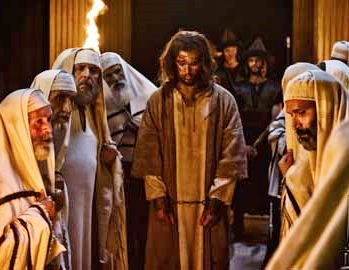After
all the time of Jesus claiming to be king of Jerusalem Jerusalem
The
Sanhedrin is the ruling council of the Judeans.
It is led by the High Priest, and all the significant laws and decisions
about the Jewish nation is made here.
Jesus is taken to them at night, where many await to accuse him. Some of them say, “We heard him say that he
would destroy the temple!” But the
witnesses contradicted each other. The
High Priest went to Jesus and said, “Don’t you hear what these witnesses say
against you? Why don’t you answer?” But Jesus remained silent.
Finally, the High Priest, angry that Jesus would say
nothing, demanded, “I command you by the Most High God—are you or are you not
the Messiah, the Son of God?” Jesus
replied, “I am. And you will see the Son
of Man coming in the clouds at the right hand of power.” The leader of all the Jews was infuriated that Jesus would claim to be beside God.
He tore his clothes in disgust and cried out, “Blasphemy! He cannot claim to have God’s authority in
heaven! What do you say?” And all of the Sanhedrin agreed that he
should be put to death. They released
Jesus to the temple guards to be beaten and sent away.
Peter, meanwhile, was sitting outside the High
Priest’s house, waiting for a verdict.
One of the girls recognized Peter and said, “Are you with that
Galileean?” Peter didn’t want to be
caught, so he answered quickly, “No.”
Another said, “Surely you are—you can’t hide your Galillean
accent.” Peter replied, “No, I’m
not.” A soldier nearby said, “I think I
saw you with him.” Peter cursed and
said, “I don’t know him!” Then he heard
a cock crow, and Peter realized that Jesus had predicted the denials Peter had
just spoke. And he ran away and wept.
The Sanhedrin could not kill Jesus legally without
Roman agreement. At that time, Judea was under the power of the Romans, who allowed the
council to create laws, but demanded that a governor rule the province. The most recent governor was Pilate, who was
known to dislike Judeans, and not understand many of their customs. The High Priest and others of the Sanhedrin
brought Jesus before Pilate and accused, “This man has called himself a king
and has been stirring up trouble in Jerusalem
and Galilee .”
Pilate didn’t want to try him so he said, “Oh, is he from Galilee . Fine,
Herod is in town, and Galilee is Herod’s
province. Let Herod deal with him.”
They brought him to Herod, who had killed John the
Baptist. Herod had heard of Jesus and
wanted to hear Jesus or to see him perform a miracle. However, Jesus said nothing and did nothing
before Herod. Herod was enraged and sent
Jesus back to Pilate to be killed.
The Sanhedrin accused Jesus of many evils before
Pilate and the crowd that was forming.
Jesus said nothing. Pilate looked
at Jesus and asked, “So, are you a king?”
Jesus replied, “I have a kingdom, but it is not of this world. If my kingdom was a worldly kingdom, my
disciples would be fighting right now.
But it isn’t.” Pilate said to the
Sanhedrin and the crowd, “I find no guilt in him.” The priests were encouraging the crowds to
cry, “Crucify him!”
Pilate said, “Look, I usually release one prisoner
at Passover time. I haven’t done that
yet. I have in my prison a man named
Barabbas. He is a rebel against the
proper authorities and he has murdered a man.
Who would you rather me release, the murderer or this so-called
‘king’?” The priests encouraged the
crowd to cry out, “Barabbas!” Pilate was
shocked, but he released the murderer.
Then he decided to have Jesus whipped thirty nine
times, so he could look weak. Jesus was
whipped bloody, and then brought out before the crowd. Pilate cried, “Look at him! See how pathetic he is! He won’t harm anyone. I am going to release him.” The crowd shouted out, “Crucify him! If you release this king, you are no friend
of Caesar’s! Crucify him!” Pilate didn’t want any bad word to get to
Caesar at this point, or his life could be at stake. So he washed his hands and said, “I have
nothing to do with this. Take him away.”
And so Jesus was sent to be crucified.
Again the high priest was questioning Him, and saying to
Him, "Are You the Christ, the Son of the Blessed One?" And Jesus
said, "I am; and you shall see THE SON OF MAN SITTING AT THE RIGHT HAND OF
POWER, and COMING WITH THE CLOUDS OF HEAVEN." (Mark 14:61-62)
Jesus answered, "My kingdom is not of this world. If My
kingdom were of this world, then My servants would be fighting so that I would
not be handed over to the Jews; but as it is, My kingdom is not of this
realm." (John 19:36)


No comments:
Post a Comment
Please no spam, ads or inappropriate language.